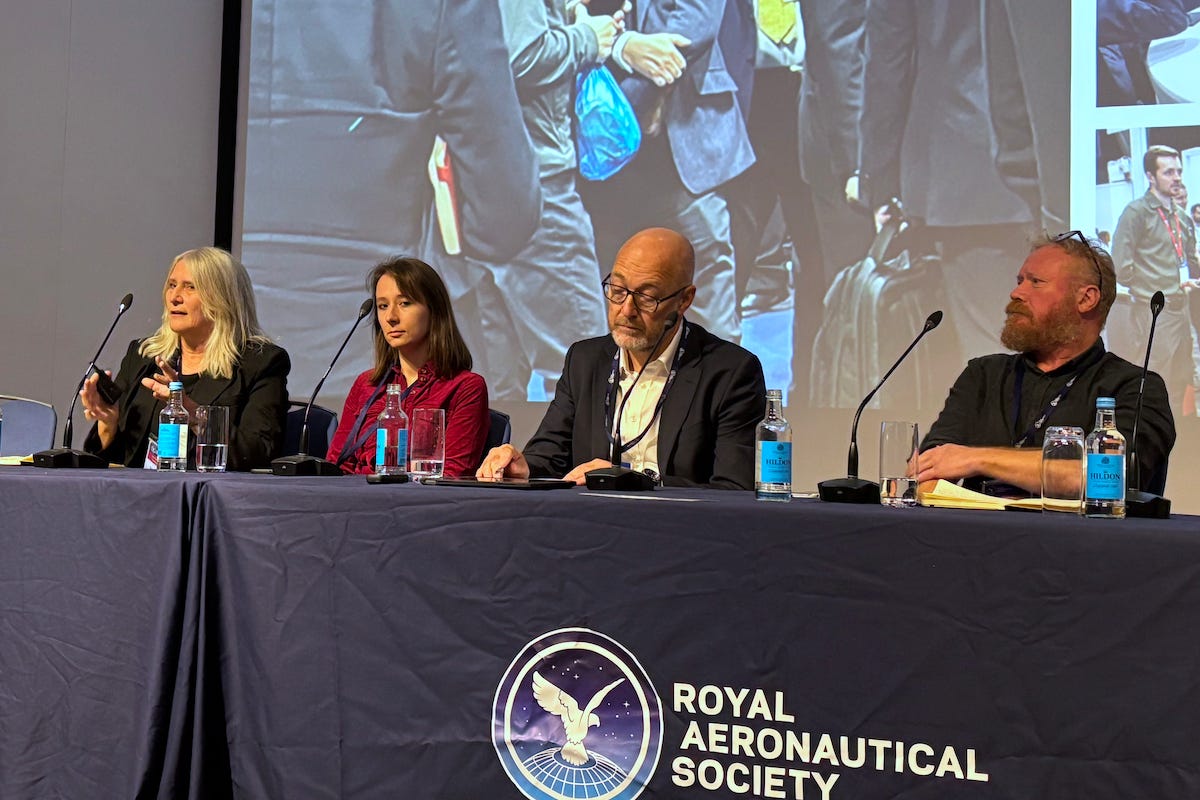Artificial Intelligence Takes Flight in Aerospace Workforce Transformation
Industry leaders at the Royal Aeronautical Society conference say AI will reshape every role from cockpit to control room

“The days when people joined as graduates or apprentices and stayed for forty years are gone,” said Adrian Binfield, Group People Director at International Airlines Group (IAG). “We’re seeing careers become more fluid, with people bringing experience from different industries, driving innovation and creativity.”
Binfield explained that IAG’s 75,000-strong workforce now logs more than three million hours of training annually, with significant investment in AI literacy and upskilling initiatives. He noted that the company’s AI Academy trains staff to utilize digital copilots for operational analysis, and that engineers now employ machine-learning tools to predict component wear and plan maintenance proactively. Flight operations teams are also using AI models to forecast delays and improve fuel efficiency.
“Technology is helping us improve everything from flight operations to customer experience,” he said. “But equally, it’s changing what employees expect—purpose, flexibility, and inclusion are now critical.”
Automation Meets Human Insight
Artificial intelligence has become an integral part of the future of aviation. “We can’t ignore AI; we need to teach people how to use it intelligently. It’s an enabler, not a threat,” said Professor Richard Curran, Professor of Aviation Management at City St George’s, University of London.
Curran, formerly of Delft University and Queen’s University Belfast, emphasised that technological proficiency alone is not sufficient.
“We must develop judgment, independence, and leadership alongside digital skills,” he said. “If we rely entirely on AI outputs, we lose creativity—the one thing machines can’t replicate.”
He pointed to ongoing research partnerships exploring AI-driven flight modeling, predictive safety analytics, and digital twin simulations for aircraft design. “These collaborations show how we can connect academic theory with operational innovation,” he explained. “Internships should expose students to these systems. Too many graduates still leave university without understanding how data and automation drive real-world decisions.”
In a follow-up conversation with TechJournal.uk, Curran expanded on these ideas and focused on the practical issue of aligning education with real industry needs. “There’s incredible talent in AI labs, but not enough pathways into applied aerospace work,” he said. “The challenge isn’t just about the quantity of placements—it’s about relevance.”
He explained that many universities and companies still operate on different calendars, making it challenging to coordinate internship timing.
“By the time a university term ends, many firms have already filled their placements,” he said. “It’s a logistical mismatch that shuts out capable students who can’t fit industry schedules.”
Curran called for structured partnerships between universities, airlines, and manufacturers to design flexible internship windows that align with academic timetables.
“We need sustained collaboration between schools and industry, not one-off projects,” he said. “If companies can plan earlier and universities adjust their cycles, students get real-world experience, and the industry gains a steady flow of work-ready graduates.”
He also highlighted examples from collaborative research with European and UK aerospace companies, where students use AI to simulate maintenance scenarios and optimise flight routes under varying conditions.
Diversity in the Digital Era
“Sustaining the UK’s leadership in AI requires us to broaden both digital and professional diversity,” said Bernice Huntley, Future Workforce Lead at the UK Space Agency. “We lack AI and machine-learning specialists, and that limits our ability to innovate.”
Huntley observed that the aerospace and space industries have traditionally drawn from a narrow academic pipeline.
“By engaging candidates from data science, systems design, and software engineering backgrounds, we can introduce fresh ideas and drive cross-sector collaboration,” she said.
Huntley added that her agency’s £2.5 million AI training fund supports new courses in data analytics and geospatial computing that use machine learning to process satellite imagery and improve mission planning.
“We’ve had a cleaner and even a butcher retrain for the space sector,” she said. “These stories prove that digital transformation can be inclusive if we build the right pathways.”
Huntley also emphasized that AI-driven hiring tools must complement, rather than replace, human judgment.
“AI might streamline recruitment, but the human touch matters,” she said. “We need visible role models who show that this sector belongs to everyone.”
The New Workforce Equation
Dr Heidi Thiemann, Director and Co-Founder of the Space Skills Alliance, noted that the growing use of AI across aerospace operations is transforming skills demand and redefining professional priorities. Her organisation’s data shows a significant increase in AI-related roles, from propulsion design to mission analytics and autonomous flight control. Thiemann said employers now view AI literacy as an essential skill alongside mathematics and systems engineering.
Her team’s research also suggests that younger professionals value purpose and impact, while AI helps streamline routine work, freeing people for creative problem-solving. She highlighted examples of AI supporting trajectory prediction, component fault detection, and system monitoring, which are accelerating innovation cycles across the industry.
Thiemann warned that poorly managed automation could undermine transparency and human expertise, emphasising the need for responsible adoption so that technology continues to complement, rather than replace, human judgment.
Redefining the Future of Work
Looking forward, Binfield said technology may displace some jobs but create many more. “The opportunity lies in equipping people to move with change,” he said. Curran added that “we need lifelong learning models where AI supports continuous upskilling.”
Huntley remarked that AI and digital twin technologies could make aerospace careers more accessible. “Remote operations, immersive simulators, and real-time collaboration tools mean geography no longer limits opportunity,” she said. “The challenge is ensuring those opportunities reach everyone.”
Thiemann noted that AI now affects most areas of aerospace, from workforce planning to sustainability, and said future success will depend on balancing technology with human adaptability.
The speakers’ consensus from London was clear: the future of flight will depend on people as much as on algorithms—on a generation of professionals ready to harness AI with imagination, integrity, and responsibility.


